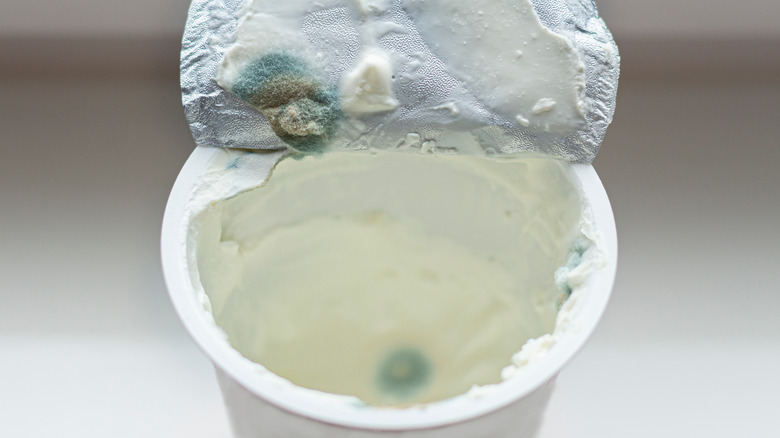What To Look For When You Suspect Your Sour Cream Has Gone Bad
If you've ever cleaned out your fridge and found a weeks-old tub of sour cream, chances are you've wondered whether it was salvageable or needed to be thrown out. While it's usually better to be safe than sorry, no one likes to waste food. After all, it's bad for the environment and a squandering of hard-earned money.
Sour cream can be kept for one to three weeks in the fridge, according to the USDA. However, this is a vague recommendation. Plus, it's tricky to keep track of exactly how long you've had the food item. If you're unsure of when you purchased this dairy product, it's crucial to be able to tell whether it's still safe to eat. To assess whether your sour cream has gone bad, look for changes in appearance, texture, smell, and taste, as per Lafianna. A change to any one of these markers is a tell-tale sign that it's time to discard your sour cream.
Signs sour cream has gone bad
When sour cream spoils, there are a number of signs indicating it isn't safe to consume. First, open it up and look at its appearance. If any mold has developed, promptly throw the container away. In addition, check for changes in texture. However, note that some separation in sour cream is perfectly normal. The liquid that develops in cultured dairy products is whey, which is naturally found in milk. The whey contains calcium, probiotics, and protein. Therefore, when you see it, simply mix it back into the sour cream to avoid throwing out these nutrients.
If your sour cream appears normal and mold-free, try smelling it. After all, according to Consumer Reports, most spoiled food often has an unpleasant smell, along with changes in texture and color. When sour cream smells sour, it's time to toss it. As a last resort, try tasting a bit of the sour cream. If it tastes bitter, EatByDate says it's gone bad. However, only taste it if it passes all other tests, as you don't want to risk foodborne illness.
How to prevent sour cream from going bad
As with any wasted food, spoiled sour cream is a disappointment. To help prevent this from happening, be sure to follow proper storage tips. Therefore, promptly refrigerate sour cream after purchasing, and keep it in the fridge when not in use. In addition, only put clean utensils in the sour cream. The experts at Does It Go Bad? warn that putting contaminated silverware into the sour cream can introduce bacteria that cause it to spoil more quickly. That said, always spoon the portion you plan on using into a separate dish, and use a clean utensil if you need more.
If you know you won't use the sour cream before it spoils, you can freeze it, keeping in mind that thawed sour cream will experience changes in texture that result in limited uses. Ultimately, freezing this ingredient shouldn't usually be necessary as there's a wide variety of sour cream uses to help prevent this product from going to waste. Plus, keeping these applications in mind can help you get the most out of the money you spent on the sour cream.


